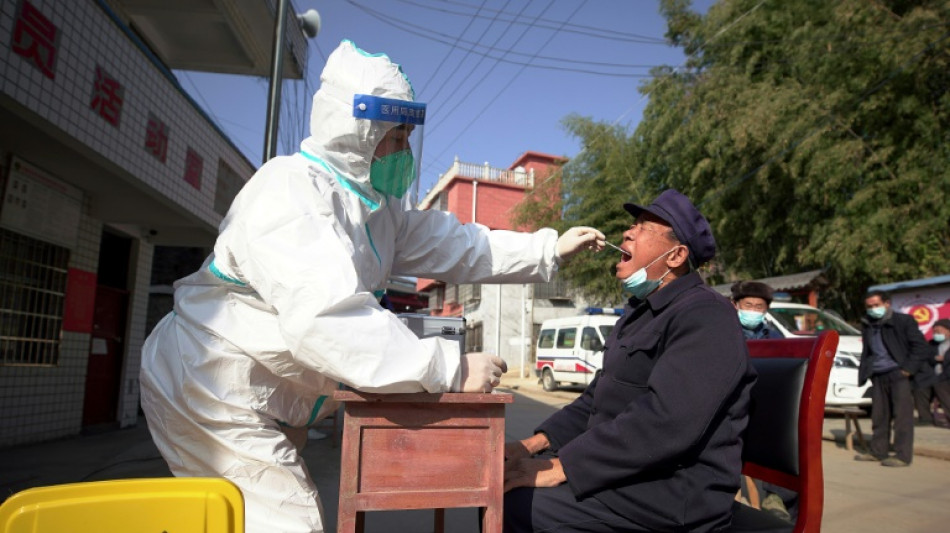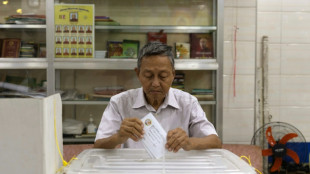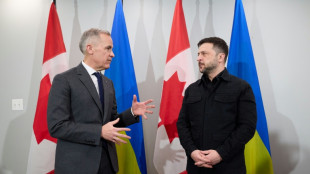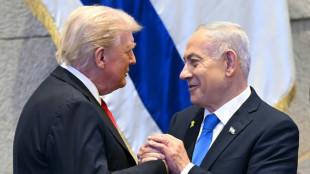
-
 How Myanmar's junta-run vote works, and why it might not
How Myanmar's junta-run vote works, and why it might not
-
Watkins wants to sicken Arsenal-supporting family

-
 Arsenal hold off surging Man City, Villa as Wirtz ends drought
Arsenal hold off surging Man City, Villa as Wirtz ends drought
-
Late penalty miss denies Uganda AFCON win against Tanzania

-
 Watkins stretches Villa's winning streak at Chelsea
Watkins stretches Villa's winning streak at Chelsea
-
Zelensky stops in Canada en route to US as Russia pummels Ukraine

-
 Arteta salutes injury-hit Arsenal's survival spirit
Arteta salutes injury-hit Arsenal's survival spirit
-
Wirtz scores first Liverpool goal as Anfield remembers Jota

-
 Mane rescues AFCON draw for Senegal against DR Congo
Mane rescues AFCON draw for Senegal against DR Congo
-
Arsenal hold off surging Man City, Wirtz breaks Liverpool duck

-
 Arsenal ignore injury woes to retain top spot with win over Brighton
Arsenal ignore injury woes to retain top spot with win over Brighton
-
Sealed with a kiss: Guardiola revels in Cherki starring role

-
 UK launches paid military gap-year scheme amid recruitment struggles
UK launches paid military gap-year scheme amid recruitment struggles
-
Jota's children join tributes as Liverpool, Wolves pay respects

-
 'Tired' Inoue beats Picasso by unanimous decision to end gruelling year
'Tired' Inoue beats Picasso by unanimous decision to end gruelling year
-
Thailand and Cambodia declare truce after weeks of clashes

-
 Netanyahu to meet Trump in US on Monday
Netanyahu to meet Trump in US on Monday
-
US strikes targeted IS militants, Lakurawa jihadists, Nigeria says

-
 Cherki stars in Man City win at Forest
Cherki stars in Man City win at Forest
-
Schwarz records maiden super-G success, Odermatt fourth

-
 Russia pummels Kyiv ahead of Zelensky's US visit
Russia pummels Kyiv ahead of Zelensky's US visit
-
Smith laments lack of runs after first Ashes home Test loss for 15 years

-
 Russian barrage on Kyiv kills one, leaves hundreds of thousands without power
Russian barrage on Kyiv kills one, leaves hundreds of thousands without power
-
Stokes, Smith agree two-day Tests not a good look after MCG carnage

-
 Stokes hails under-fire England's courage in 'really special' Test win
Stokes hails under-fire England's courage in 'really special' Test win
-
What they said as England win 4th Ashes Test - reaction

-
 Hong Kongers bid farewell to 'king of umbrellas'
Hong Kongers bid farewell to 'king of umbrellas'
-
England snap 15-year losing streak to win chaotic 4th Ashes Test

-
 Thailand and Cambodia agree to 'immediate' ceasefire
Thailand and Cambodia agree to 'immediate' ceasefire
-
Closing 10-0 run lifts Bulls over 76ers while Pistons fall

-
 England 77-2 at tea, need 98 more to win chaotic 4th Ashes Test
England 77-2 at tea, need 98 more to win chaotic 4th Ashes Test
-
Somalia, African nations denounce Israeli recognition of Somaliland

-
 England need 175 to win chaotic 4th Ashes Test
England need 175 to win chaotic 4th Ashes Test
-
Cricket Australia boss says short Tests 'bad for business' after MCG carnage

-
 Russia lashes out at Zelensky ahead of new Trump talks on Ukraine plan
Russia lashes out at Zelensky ahead of new Trump talks on Ukraine plan
-
Six Australia wickets fall as England fight back in 4th Ashes Test

-
 Dental Implant Financing and Insurance Options in Georgetown, TX
Dental Implant Financing and Insurance Options in Georgetown, TX
-
Man Utd made to 'suffer' for Newcastle win, says Amorim

-
 Morocco made to wait for Cup of Nations knockout place after Egypt advance
Morocco made to wait for Cup of Nations knockout place after Egypt advance
-
Key NFL week has playoff spots, byes and seeds at stake

-
 Morocco forced to wait for AFCON knockout place after Mali draw
Morocco forced to wait for AFCON knockout place after Mali draw
-
Dorgu delivers winner for depleted Man Utd against Newcastle

-
 US stocks edge lower from records as precious metals surge
US stocks edge lower from records as precious metals surge
-
Somalia denounces Israeli recognition of Somaliland

-
 The Cure guitarist and keyboard player Perry Bamonte dies aged 65
The Cure guitarist and keyboard player Perry Bamonte dies aged 65
-
Draper to miss Australian Open

-
 Police arrest suspect after man stabs 3 women in Paris metro
Police arrest suspect after man stabs 3 women in Paris metro
-
Former Montpellier coach Gasset dies at 72

-
 Trump's Christmas gospel: bombs, blessings and blame
Trump's Christmas gospel: bombs, blessings and blame
-
Russia lashes out at Zelensky ahead of new Trump meeting on Ukraine plan


Covid no longer a global health emergency: WHO
The Covid-19 pandemic, which killed millions of people and wreaked economic and social havoc, no longer constitutes a global health emergency, the WHO said Friday, warning that the threat remained.
It is "with great hope that I declare Covid-19 over as a global health emergency", World Health Organization chief Tedros Adhanom Ghebreyesus told reporters.
The move came after the WHO's independent emergency committee on the Covid crisis agreed it no longer merited the organisation's highest alert level and "advised that it is time to transition to long-term management of the COVID-19 pandemic".
But the danger was not over, according to Tedros, who estimated Covid had killed "at least 20 million" people -- about three times the nearly seven million deaths officially recorded.
"This virus is here to stay. It is still killing, and it's still changing," he said.
"The worst thing any country could do now is to use this news as a reason to let down its guard, to dismantle the systems it has built, or to send the message to its people that Covid-19 is nothing to worry about."
- Never again -
The UN health agency first declared the so-called public health emergency of international concern (PHEIC) over the crisis on January 30, 2020.
That was weeks after the mysterious new viral disease was first detected in China and when fewer than 100 cases and no deaths had been reported outside that country.
But it was only after Tedros described the worsening Covid situation as a pandemic on March 11, 2020, that many countries woke up to the danger.
By then, the SARS CoV-2 virus which causes the disease had already begun its deadly rampage around the globe.
"One of the greatest tragedies of Covid-19 is that it didn't have to be this way," Tedros said, decrying that "a lack of coordination, a lack of equity and a lack of solidarity" meant "lives were lost that should not have been".
"We must promise ourselves and our children and grandchildren that we will never make those mistakes again."
Even though Covid deaths globally have plunged 95 percent since January, the disease remains a major killer.
Last week alone "Covid-19 claimed a life every three minutes", Tedros said, "and that's just the deaths we know about."
"The emergency phase is over, but Covid is not," agreed Maria Van Kerkhove, the WHO's technical lead on Covid-19.
- 'We can't forget' -
Vaccines, which were developed at record speed and started rolling out by late 2020, remain effective at preventing severe disease and death, despite new and more infectious Covid variants that have appeared.
To date, 13.3 billion doses of Covid vaccines have been administered, with 82 percent of adults over 60 having received the initial jabs.
However greed and gaping inequities surfaced, as wealthy countries hoarded the jabs and poorer ones struggled for months to get hold of a single dose.
An antivax movement on steroids and massive misinformation campaigns over social media meanwhile turned vaccination into a charged political issue.
The pandemic also exposed staggering inequality in access to healthcare and services, from the long lines of Brazilians waiting for oxygen for loved ones gasping for air, to the funeral pyres that crammed New Delhi's sidewalks as the bodies piled up in early 2021.
"We can't forget those fire pyres, we can't forget the graves that were dug," Van Kerkhove said, her voice catching with emotion. "I won't forget them."
- Origins a mystery -
Tedros has warned of the ongoing impact of Long Covid, which provokes numerous and often severe and debilitating symptoms that can drag for years.
This condition has been estimated to impact one in 10 people who contract Covid, suggesting that hundreds of millions could need longer-term care, he cautioned.
The world is currently striving to put in place measures to help avert future global health catastrophes.
The virus was first detected in late 2019 in Wuhan China, but it remains unclear how and where it first began spreading among humans.
The issue, which has been heavily politicised, has proved divisive for the scientific community, which is split between a theory that the virus jumped naturally to humans from animals and one maintaining that the virus likely leaked from a Wuhan laboratory -- a claim China angrily denies.
WHO and its member states have meanwhile launched discussions about an international treaty or something similar to draw lessons from the mistakes made and ensure the world reacts more effectively and equitably to the next one.
The question is not if, but when.
F.Pedersen--AMWN



